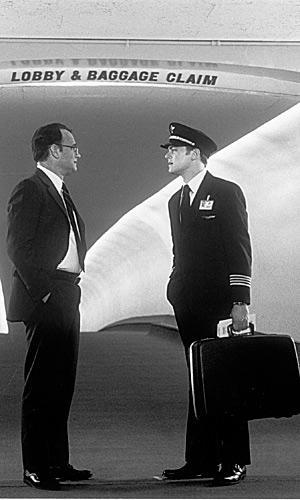Sometimes life is stranger than fiction. This is the case with Steven Spielberg’s new movie, “Catch Me If You Can.” If there wasn’t a disclaimer at the end telling the audience it was a true story, no one would believe it.
The movie premiered Dec. 25 with Leonardo DiCaprio and Tom Hanks playing the leading roles of Frank W. Abagnale Jr. and FBI Agent Carl Hanratty, respectively.
The movie is based on the autobiographical novel of the same name. After his parents divorced, the real man behind the movie ran away from home at 16 years old and had to get by on his own. What began as a way to get by turned into a game.
“I was an opportunist, so when I saw an opening I asked myself ‘Could I get away with that?'” said Abagnale in a press release. “The more I got away with, the more of a game it became — a game that I knew that I would ultimately lose, but a game I was going to have fun playing until I did.”
The movie begins as Abagnale’s parents run into trouble and soon are divorced. The young rogue runs away and begins to forge checks and pass himself off as a co-pilot for a major airline. In his travels over the next few years, he steals more than $4 million and poses as a doctor and lawyer.
The elaborate yet hokey intro to the movie first catches the audience’s eye. The opening credits are more than two minutes long and animated. This sets the feel for the rest of the movie’s innocent 1960s setting.
Almost everyone associates the ’60s with the counterculture, but the movie takes place in a time before, when the country was still innocent. This innocence allows Abagnale to accomplish all of this.
Spielberg gives the movie an authentic ’60s feel with the cars and costumes of all the characters. Hanks and DiCaprio do an excellent job of portraying the innocence of the times. The score, with its heavy jazz content, ties the whole movie together and gives audience members a feel for the ’60s.
While DiCaprio does an excellent job of getting the audience to feel sorry for his character, sometimes he’s just not believable as a master check-forger and impersonator.
The FBI sends agent Carl Hanratty after Abagnale to bring him to justice. Hanratty is a workaholic and catching Abagnale becomes an obsession.
“This just goes to show that crime really does pay,” said Josh Roberts, a biological sciences senior. “After a few years in prison, you get a book deal and then a movie deal.”
The movie’s score is truly amazing. John Williams, who composed most of the movie’s music, put together a contemporary jazz undertone for the movie that delivers a historic sound to the audience.
By the end of the movie, the audience is hoping Abagnale will be caught. For Abagnale, the game has lost most of its fun and he wants out. The audience just wants to see it end because they feel sorry for him.
Movie ‘catches’ viewers’ attention
January 21, 2003

Movie ‘catches’ viewers’ attention



